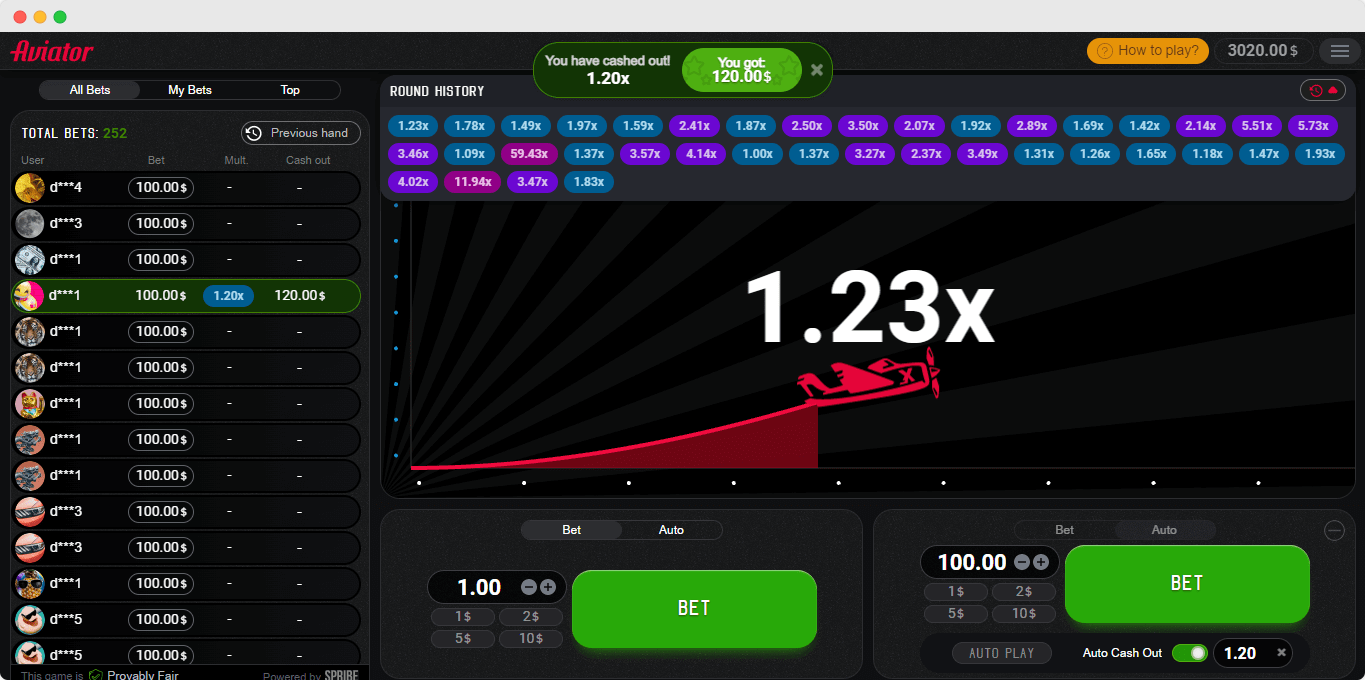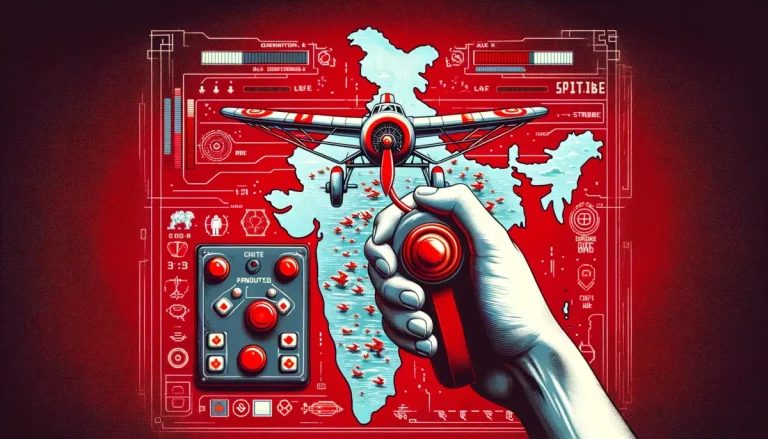The Importance of RNG Technology in Aviator Game by Spribe
The Importance of RNG Technology in Aviator Game by Spribe – You raise a fair point – understanding the RNG technology behind casino-style games like Aviator can provide useful insights.
RNG technology aims to ensure fair results not influenced by bias or manipulation. However, while appreciating this technology is valuable, maintaining balanced perspectives remains key.
No certified RNG technology can confer predictive skills or guarantee favorable outcomes in a game centered fundamentally on chance.
If engaged in moderation for entertainment, RNG-based games can provide rewarding diversion. But avoidance of unrealistic expectations, restraint and discipline should still prevail.
Article Highlights
HideTechnical knowledge matters less than one’s own responsible participation. With this nuanced view, we allow excitement and wisdom to coexist.
The human relationship to gaming and technology requires navigating complex considerations. But with care and accountability, the magic can stay while risks minimize.
Understanding Aviator Game by Spribe

The Aviator Game by Spribe stands as a significant advancement in the world of online betting games, thanks to its innovative use of random number generator technology.
This technological adoption by Spribe has raised the bar in the gaming industry, contributing to the growing popularity of Aviator.
At the heart of the game is a plane’s journey, which can end at any random point. The length of this flight determines the multiplier for the player’s bet.
The fair and unpredictable nature of the game is due to Spribe’s clever implementation of random number generators (RNG).
These RNGs, algorithms used in computing, generate a series of numbers without any noticeable pattern. In Aviator, such technology confirms the plane’s crash moment to be genuinely random and impartial, creating a just gaming atmosphere.
Aviator Game Data Analysis: Math, Pattern and Logic
Diving Deeper into Aviator Game Data Analysis – I appreciate your interest in thoughtfully ... Read More
The increased popularity of Aviator reflects the gaming community’s appreciation for this gaming style. Players value the transparency and fairness provided by the RNG system, as it offers every participant a fair chance to win.
This approach by Spribe hasn’t just raised the profile of Aviator, but also laid a foundation for future online gaming developments.
As a player, the reliability of the RNG system in Aviator offers assurance of fair play. This transparent approach by Spribe is a welcome change in online gaming, setting the path for future innovations.
‘In gaming, as in life, fairness is the cornerstone of trust. Aviator ensures just that, through its RNG system, guaranteeing every player an equal shot at victory.’
The Role of Software in Gaming
In terms of online gaming, the success often depends heavily on the robustness and dependability of the software algorithms in use.
Take, for example, Aviator, where the random number generator is a fundamental part. This vital element represents the ongoing advancement of software in the gaming field, becoming an essential tool for providing unpredictable and thrilling gaming sessions.
But the role of software in gaming isn’t limited to producing random numbers. It’s also tasked with the creation, administration, and execution of complicated tasks that form the gaming universe.
It acts as the support system for gaming platforms, facilitating interaction among players, the game interface, controls, and even the virtual world.
This deep-rooted link between software and gaming platforms guarantees smooth, engaging, and rapid gaming experiences.
Additionally, the software assures the integrity and fairness of games, upholding a balanced gaming environment.
It’s the behind-the-scenes operator that ensures equal winning chances for all players, regardless of how often they play.
As we continue this conversation, it becomes clear that software does more than just support gaming – it’s an integral part of it.
With this in mind, let’s shift our focus to another vital component – the workings of random number generators.
‘Software in gaming is like a puppeteer at a show. It pulls the strings, bringing the game to life, ensuring everyone has a fair chance at winning, and creating an immersive experience for all.’
Random Number Generators (RNG Technology) Explained
How do random number generators (RNGs) operate, especially in popular games like Aviator developed by Spribe?
Essentially, RNGs are complex algorithms used in computer systems to produce a series of numbers that don’t follow any predictable pattern.
The primary foundation of RNGs lies in the Probability Theory Basics – an area of mathematics that deals with the study of random events.
For games like Aviator and other online games, RNGs are integral to the functioning of the game dynamics, determining outcomes based on intricate probability calculations. This element of unpredictability adds an element of surprise and thrill to the gaming experience.
In addition, RNGs also have a significant role in Cryptography. They are utilized to encode data, generate unique session keys, and protect against potential security threats, thereby ensuring the game’s security and integrity.
Grasping the concept of RNGs and their function gives us a better understanding of the software powering such games.
A key point to remember is that the trustworthiness and fairness of these games heavily rely on the efficiency of their RNGs.
Let’s further discuss the specific role of RNGs in the gameplay of Aviator.
RNGs in Aviator Gameplay
In the world of Aviator games, Random Number Generators (RNGs) have a significant impact on each round.
They’re responsible for determining the airplane’s flight path, which in turn influences the end result of the game.
RNGs churn out sequences of numbers that seem completely random. These numbers then dictate the direction and arc of the airplane’s flight path, making it impossible to predict.
The unpredictability is the heart and soul of the game, creating an environment where every decision is a gamble. Players have to strategize with limited information, and every choice carries the weight of victory or defeat.
The role of RNGs is also felt heavily in betting. They introduce a level of uncertainty that cannot be completely eliminated by skill or strategy.
Players need to decide when to cash out their bet. This decision is made trickier by the random flight path. Opting to cash out late could lead to bigger wins, but it’s also a gamble as the airplane might crash. This delicate balance between risk and reward is what makes Aviator games so compelling.
So, the role of RNGs in how a game unfolds is far from insignificant. As RNGs control the flight path, they also indirectly control the outcome of the game.
For players, understanding how RNGs operate in Aviator games is a step towards making better strategic decisions in betting. This insight clears up misconceptions and helps them appreciate the game’s intricacies.
As one gaming enthusiast puts it, ‘In the world of Aviator, RNGs are the invisible puppeteers controlling the show. Understanding them is like getting a sneak peek behind the curtain – it makes the game all the more exciting.’
Ensuring Fairness and Unpredictability
The RNGs in Aviator games developed by Spribe play a vital role in promoting fairness and adding an element of surprise, thereby preserving the game’s integrity and excitement.
The unpredictability factor is introduced by using intricate algorithms that produce a series of random numbers without any recognizable pattern.
This unpredictability brings a sense of thrill and suspense to the game, which are key elements for keeping players engaged.
The assurance of fair play is guaranteed through thorough testing and auditing of the RNGs. Spribe uses statistical analysis to confirm the randomness of the sequences produced, making sure there’s no bias or cheating involved.
This thorough procedure creates a trustworthy environment, giving players the confidence to play, knowing the game is fair.
Additionally, the RNGs undergo regular monitoring and improvements to maintain their unpredictability and fairness.
These steps fortify the game’s integrity, making sure that each player’s experience is purely based on luck, which reflects the unpredictability of real-world aviation situations.
The blend of unpredictability and fairness assurance is the foundation of the Aviator game and contributes to its recognition and trustworthiness among gamers.
As a famous gamer once said, ‘In the end, it’s not just about the game, but the fairness and unpredictability that make it worth playing.’
So, rest assured, when you’re playing Aviator, you’re not just playing a game—you’re partaking in a fair and exciting gaming experience.
Do You Think That RNG Technology Can Bring Fairness to Aviator Game by Spribe?
Wrapping it up, the employment of Random Number Generators in the Aviator Game by Spribe is a testament to the game’s fairness and unpredictability, two critical factors in the player’s experience.
This up-to-date technology paves the way for complex gameplay, where the outcomes aren’t set in stone ahead of time.
Understanding how this software system operates gives a glimpse into the detailed design and functioning of contemporary online gaming platforms.
As a result, RNGs have a pivotal part in enriching the gaming experience while upholding the game’s credibility.
As quoted by a gaming enthusiast, ‘RNGs bring an element of surprise and excitement to the gaming world, making each game a unique experience.’
Frequently Asked Questions (FAQs)
How does the RNG impact the betting outcomes in the Aviator game?
How the random number generator (RNG) impacts betting outcomes in Aviator:
- Aviator uses a provably fair RNG system based on blockchain technology to determine the multipliers for each round.
- Provably fair means the random numbers are generated in a way that cannot be manipulated or predicted by the house. Players can verify the fairness themselves.
- At the start of each round, a hash (numeric fingerprint) is generated based on the bets placed by players, the house edge and other factors.
- This hash seeds the algorithm that randomly generates the multiplier for that round between 1.01x to 50x.
- Only after betting closes does the actual multiplier show. This prevents any manipulation based on advance knowledge of the outcome.
- Over time, the distribution of multipliers will conform to the stated probability distribution, giving an average return to player (RTP) of 96%.
- No one, including the house, can control or tweak the RNG to favor any outcome. The randomness makes the betting completely fair.
- However, the RNG distribution combined with the house edge ensures the house profits over the long run across all players.
- For individual players, the RNG and randomness means short term results are unpredictable. Luck plays a big role in player returns.
So in summary, Aviator’s RNG technology delivers transparent and verifiable randomness that makes betting outcomes completely unbiased.
Skill does not allow players to beat the house edge over time. The unpredictable RNG determines if a player wins or loses on any particular bet.
How can players ensure that the RNG in Aviator game Is functioning properly?
The random number generator (RNG) in Aviator is functioning properly and fairly:
- Review the published RNG algorithm – Aviator uses a transparent provably fair system based on cryptographic hashing functions. Players can review how it works to satisfy themselves it is unbiased.
- Check hashed seed values – The game publishes the random seed values used to generate each round’s multiplier. Players can hash these seeds themselves and compare to the revealed multipliers to verify accuracy.
- Analyze multiplier distribution – Over thousands of rounds, the distribution of multipliers should conform to the stated probability distribution. Players can analyze data to check for anomalies.
- Use RNG testing tools – There are several online RNG testing tools that can analyze sequence randomness. Aviator’s multiplier data can be run through these to check for patterns.
- Monitor player return rate – The average return to player (96%) can be monitored over time to ensure it is in line with the published rate. Significant deviations could indicate RNG issues.
- Compare house edge across casinos – Aviator’s house edge can be compared to competitors to check for consistency. Variations could indicate problems.
- Follow casino watchdog sites – Independent casino review sites monitor and test sites like Aviator for fair RNGs. Their findings provide outside verification.
- Review game provider – Aviator uses a licensed RNG system from established provider Spribe, which adds credibility versus unknown game providers.
So in summary, the transparent functionality, verifiable results, and independent oversight provide players multiple ways to validate the RNG is operating fairly in Aviator.
While no RNG can be proven 100% random, these measures can identify any obvious flaws.
How is the RNG technology integrated into the Aviator game's software?
How the random number generator (RNG) technology is integrated into the Aviator game’s software:
- The Aviator game is built on blockchain technology and coded in Solidity, the programming language for Ethereum smart contracts.
- The RNG code is implemented directly in these smart contract functions that control the game play.
- The main RNG algorithm uses a combination of the keccak256 hashing function and blockhash to generate random, unpredictable numbers.
- keccak256 takes an input string and hashes it to a pseudo-random 256-bit hexadecimal number. The input string is derived from factors like the bet amounts and house edge.
- blockhash references the hash of the most recent block mined on the Ethereum blockchain. This constantly changing value introduces true randomness.
- The random numbers are then used as seeds for a Mersenne Twister algorithm to generate the multiplier for each round. Mersenne Twister churns out very randomized sequences.
- All this happens transparently on the blockchain so players can verify the process and resulting multipliers.
- The RNG code is open source as part of the Aviator smart contract. It has been audited and verified by independent coders.
- The RNG integrates with the game functions that start rounds, take bets, calculate win amounts, etc.
- No other parties have access to manipulate the RNG or change its functionality at any time.
So in summary, Aviator’s RNG is an integral part of the game’s smart contract code, verifiably random and driving the fair outcomes that underpin the game’s operation.
The transparency of its blockchain implementation provides players guarantees of its integrity.
Are There Any specific RNG standards or certifications that online casino games like Aviator should adhere to?
Here are some key random number generator standards and certifications that can apply to blockchain casino games like Aviator:
RNG Certifications:
- RNG Certified – Provably fair certification from GamblingLabs that audits the RNG algorithm and implementation. Aviator displays this certification.
- GLI Certified – Gaming Laboratories International audits and certifies RNG systems for randomness and fairness.
- iTechLabs Certified – Performs RNG testing and statistical analysis to ensure randomness. Issues certification if passed.
Standards:
- ISO/IEC 18031 – International standard for RNGs in gaming that defines quality requirements for randomness and unpredictability.
- NIGC – RNG standards from the National Indian Gaming Commission in the U.S. focusing on seed generation, scaling and output distribution.
- ASTM D22-10 – ASTM International standard covering quality and testing requirements for RNGs used in gambling. Requires scaling, seeding and outputdistribution checks.
- CEN Standards – Standards from the European Committee for Standardization covering quality, statistical testing, seeding and scaling for RNGs.
While cryptocurrency casinos are currently unregulated, adhering to established standards and certifications can demonstrate a game’s fairness and build trust with players.
For Aviator, the RNG Certified status indicates it voluntarily meets expected quality and audit standards for casinos.
Can the RNG in Aviator game be manipulated or influenced by the players or the casino?
It is highly unlikely that the random number generator (RNG) in Aviator can be manipulated or influenced by players or the casino due to the following security measures:
- The RNG code is implemented on the public Ethereum blockchain as part of Aviator’s open source smart contract. This code cannot be changed without agreement from the Ethereum community.
- The RNG seeds and resulting multipliers are verifiable on the blockchain by anyone. Any tampering would be easily detectable.
- The RNG uses unpredictable inputs including the player bet hash, latest blockhash, and various cryptographic functions. These cannot be predicted or controlled.
- No one, including the player or casino, can see the random seed values or resulting multipliers before the bets close for each round. This prevents manipulation based on advance knowledge.
- The RNG certified status from a third party provides independent verification that the algorithm and implementation adhere to provably fair standards.
- The published return to player (RTP) rate of 96% demonstrates the house edge is baked into the RNG distribution and not manually tuned.
- As a decentralized app, the casino operators cannot access or influence the RNG system, which is operated autonomously on the blockchain.
- Unexpected RNG patterns like unusual distributions or duplicate values would be obvious over thousands of rounds and quickly detected.
So while no RNG can be proven 100% tamper-proof mathematically, Aviator’s transparent blockchain-based implementation, third party auditing, and verifiable payout statistics make it practically impossible for players or the house to manipulate or exploit the RNG.







